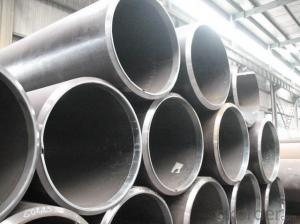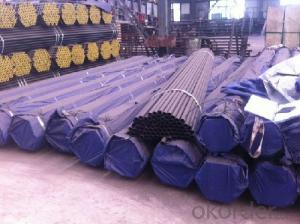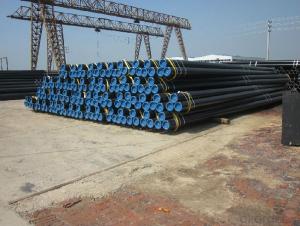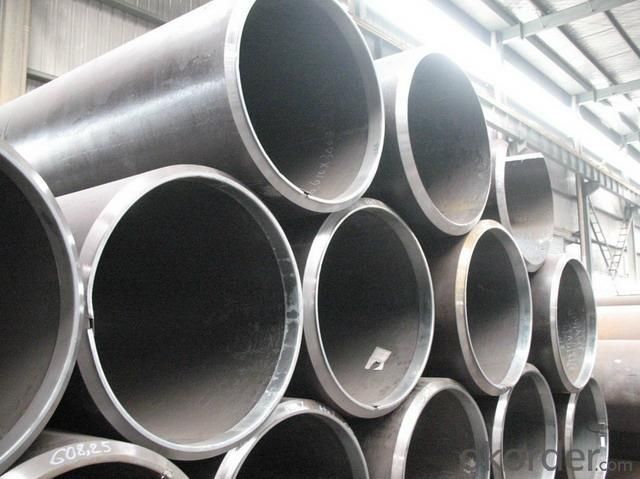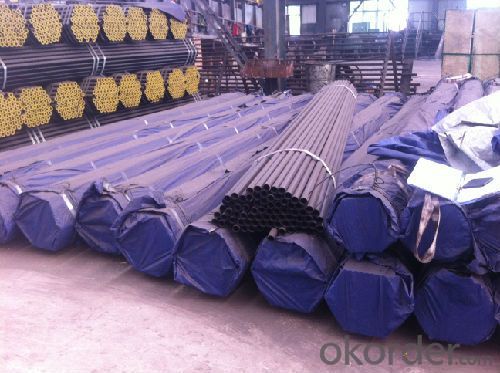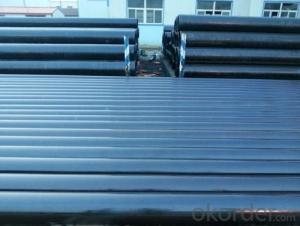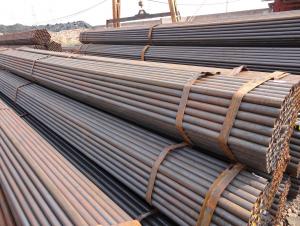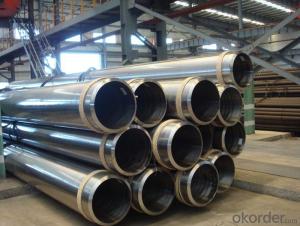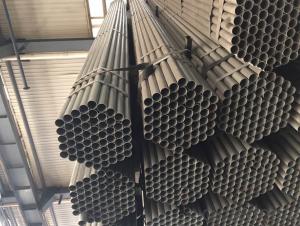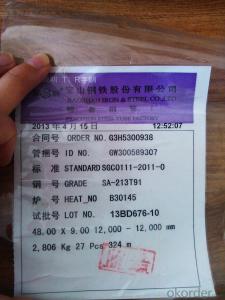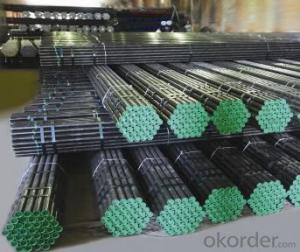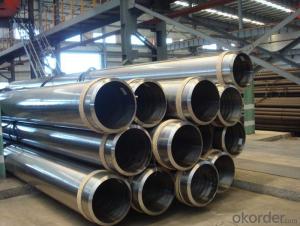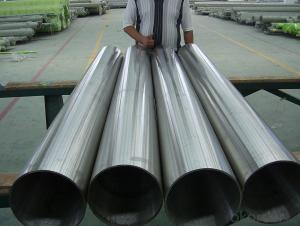Stainless Steel Boiler Tube ASTM A213 Multi Specifications
- Loading Port:
- Tianjin
- Payment Terms:
- TT or LC
- Min Order Qty:
- 10 m.t.
- Supply Capability:
- 3000 m.t./month
OKorder Service Pledge
OKorder Financial Service
You Might Also Like
Product Description:
1、Structure of Boiler Heat Exchange Stainless Steel Pipe Description:
Boiler Heat Exchange stainless steel pipe is often used in the heating system. High chromium molybdenum welded steel pipe can work in the extreme, which maintain as the ideal material for the construction of power station.
2、Main Features of Boiler Heat Exchange Stainless Steel Pipe :
• High manufacturing accuracy
• High strength
• Small inertia resistance
• Strong heat dissipation ability
• Good visual effect
•Reasonable price
3、Boiler Heat Exchange Stainless Steel Pipe Images:
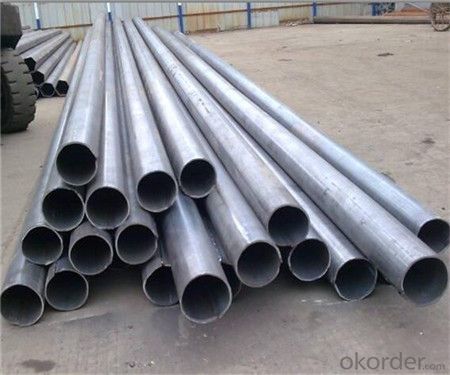
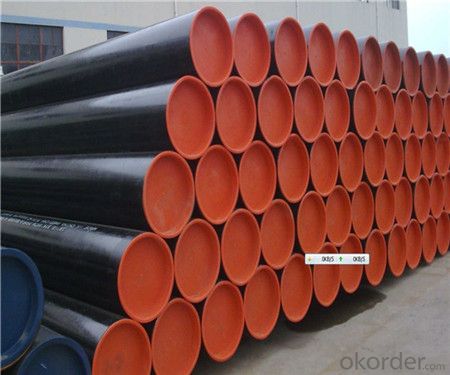
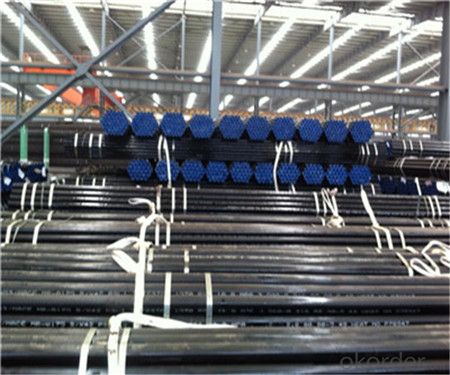
4、Boiler Heat Exchange Stainless Steel Pipe Specification:
| Material Grade | 304,304L,316 ,316L,321,310S,2205,904and so on. |
| Standard | ASTM A312, A554, A249, A269 and A270,ect |
| DIN 17456-85 , DIN 17458-85, DIN 17459-92,ect | |
| JIS G3446-1994, JIS G3448-1997, JIS G3459-1997, JIS G3463-1994,ect | |
| GB13296-1991, GB14975-2002, GB14976-2002,ect | |
| Outer Diameter | 13.7-2020mm |
| Thickness | 0.5-50mm |
| Length | 1m -12m or as customers' request |
| Polish | 180G, 320G, 400G Satin / Hairline |
| 400G, 500G, 600G or 800G Mirror finish | |
| Test | eddy current inspection, ultrasonic inspection, X-ray inspection, real-time imaging, hydrostatic test, spectral analysis, intergranular corrosion, water pressure test, and mechanical property testing facilities. |
| Payment | 1) by L/C at sight, |
| 2) 30% deposit, 70% balance before Shipping. | |
| Delivery time | A.7 days if this goods is stock goods. |
| B.25 days if this goods will be produced after order | |
| Validity | Valid time is 3 days for price usually. |
| Payment terms | FOB QINGDAO |
| MOQ | 1 ton |
| Capacity | 1000 ton per month |
| Certificate | ISO, SGS, and third part inspection |
| Applications | the products are widely used in chemical industry, condenser pipe, heat exchanger, petroleum, shipping military, environment protection, high temperature resistant, low temperature resistant, corrosion resistant and so on. |
| packing details | 1) Wooden-box Package. 2) The Wooden Frame Packing. 3) Intertexture Cloth Packaging with the Iron Sheet Bonding and the Two Terminals Covered With Plastic Dome. |
5、FAQ of Boiler Heat Exchange Stainless Steel Pipe:
①How is the quality of your products?
Our products are manufactured strictly according to national and internaional standard, and we take a test on every pipe before delivered out. If you want see our quality certifications and all kinds of testing report, please just ask us for it.
Guaranteed: If products’ quality don’t accord to discription as we give or the promise before you place order, we promise 100% refund.
②How about price?
Yes, we are factory and be able to give you lowest price below market one, and we have a policy that “ for saving time and absolutely honest business attitude, we quote as lowest as possible for any customer, and discount can be given according to quantity”,if you like bargain and factory price is not low enough as you think, just don’t waste your time.Please trust the quotation we would give you, it is professional one.
③Why should you chose us?
Chose happens because of quality, then price, We can give you both.Additionally, we can also offer professional products inquiry, products knowledge train(for agents), smooth goods delivery, exellent customer solution proposals.Our service formula: good quality+good price+good service=customer’s trust
SGS test is available, customer inspection before shipping is welcome, third party inspection is no problem.
Any question, pls feel free to contact us !
- Q: How are steel pipes used in the construction of underground parking structures?
- Steel pipes are used in the construction of underground parking structures for various purposes, such as providing structural support, drainage, and ventilation. They are commonly used as piles or caissons to support the weight of the structure and prevent it from sinking into the ground. Additionally, steel pipes are utilized for the installation of drainage systems to prevent water accumulation and ensure the structural integrity of the parking structure. They are also employed for ventilation purposes, allowing fresh air to circulate and remove any potentially hazardous gases. Overall, steel pipes are essential components in the construction of underground parking structures, ensuring their stability, safety, and functionality.
- Q: What are the different types of steel pipe connections?
- There are several types of steel pipe connections, including threaded connections, welded connections, flanged connections, and grooved connections.
- Q: What is the difference between carbon steel and alloy steel pipes?
- The main difference between carbon steel and alloy steel pipes lies in their composition. Carbon steel pipes are primarily made from iron and carbon, while alloy steel pipes are made from iron, carbon, and other elements such as manganese, nickel, chromium, or molybdenum. Alloy steel pipes have enhanced mechanical properties and better resistance to corrosion, heat, and pressure compared to carbon steel pipes. Additionally, alloy steel pipes are typically used in more demanding applications where strength and durability are critical.
- Q: What are the different methods of coating steel pipes for insulation?
- Insulating steel pipes can be achieved through various methods, each with its own pros and cons. 1. One method involves applying a layer of thermal insulation material, like mineral wool or foam, onto the steel pipes. This helps minimize heat transfer and energy loss. While these coatings are easy to apply and offer excellent insulation properties, they are prone to degradation over time and require regular maintenance and replacement. 2. Another approach is to coat the steel pipes with materials that protect against corrosion, such as epoxy or polyethylene. These coatings act as a barrier, shielding the pipes from moisture, chemicals, and other corrosive elements. They are durable and long-lasting, providing effective protection. However, they may not offer significant thermal insulation. 3. Fusion-bonded epoxy (FBE) coating is a popular method that combines both insulation and corrosion protection. It involves applying a layer of epoxy powder to the pipes and heating it to create a strong bond. FBE coatings offer excellent adhesion, corrosion resistance, and some thermal insulation properties. They are commonly used in oil and gas pipelines, enduring harsh environments and high temperatures. 4. Polyurethane foam is often used as an insulation coating for steel pipes. It is applied by spraying or injecting the foam onto the pipe surface, where it expands and hardens, forming a protective layer. Polyurethane foam coatings provide exceptional thermal insulation and can be applied to pipes of different shapes and sizes. However, they require specialized equipment and expertise and may be susceptible to physical damage or moisture absorption if not properly sealed. 5. Ceramic coatings offer yet another option for insulating steel pipes. These coatings are typically applied through a thermal spray process, creating a layer of ceramic material on the pipe surface. Ceramic coatings provide insulation against high temperatures, corrosion resistance, and thermal shock protection. They are commonly used in industries like power generation and aerospace, where extreme temperature conditions are present. However, ceramic coatings can be costly and require specialized equipment and expertise for application.
- Q: What is the creep resistance of steel pipes?
- The creep resistance of steel pipes refers to their ability to withstand deformation or strain under long-term exposure to high temperatures and constant stress. Steel pipes exhibit good creep resistance due to their high melting point and structural integrity, making them suitable for applications that involve elevated temperatures and prolonged use.
- Q: Can steel pipes be used for oil refinery applications?
- Yes, steel pipes can be used for oil refinery applications. Steel pipes offer many advantages for oil refinery applications including high strength, durability, and resistance to corrosion. They are able to withstand high pressure and temperature conditions that are common in oil refinery operations. Steel pipes are also easy to transport and install, making them a popular choice for oil refinery projects. Additionally, steel pipes can be customized to meet specific requirements such as size, thickness, and coating, making them suitable for a wide range of oil refinery applications.
- Q: Can steel pipes handle extreme weather conditions?
- Yes, steel pipes are known for their durability and ability to withstand extreme weather conditions. They are resistant to corrosion, rust, and can handle high temperatures, making them suitable for various climate conditions.
- Q: What are the different types of steel pipe coatings for chemical processing plants?
- There are several types of steel pipe coatings commonly used in chemical processing plants, including epoxy coatings, polyethylene coatings, and fusion-bonded epoxy coatings. These coatings provide protection against corrosion and chemical damage, ensuring the longevity and safety of the pipes in such environments.
- Q: What are the different grades of steel used in manufacturing pipes?
- There are several grades of steel used in manufacturing pipes, including carbon steel, alloy steel, stainless steel, and duplex steel. Each grade has distinct properties and characteristics that make it suitable for different applications and environments.
- Q: Can steel pipes be used for LNG terminals?
- Yes, steel pipes can be used for LNG terminals. Steel pipes are commonly used in LNG terminals for transporting and distributing liquefied natural gas due to their strength, durability, and ability to withstand extreme temperatures and pressures. Additionally, steel pipes can be easily welded and have excellent corrosion resistance, making them suitable for the transportation and storage of LNG.
Send your message to us
Stainless Steel Boiler Tube ASTM A213 Multi Specifications
- Loading Port:
- Tianjin
- Payment Terms:
- TT or LC
- Min Order Qty:
- 10 m.t.
- Supply Capability:
- 3000 m.t./month
OKorder Service Pledge
OKorder Financial Service
Similar products
Hot products
Hot Searches
Related keywords
